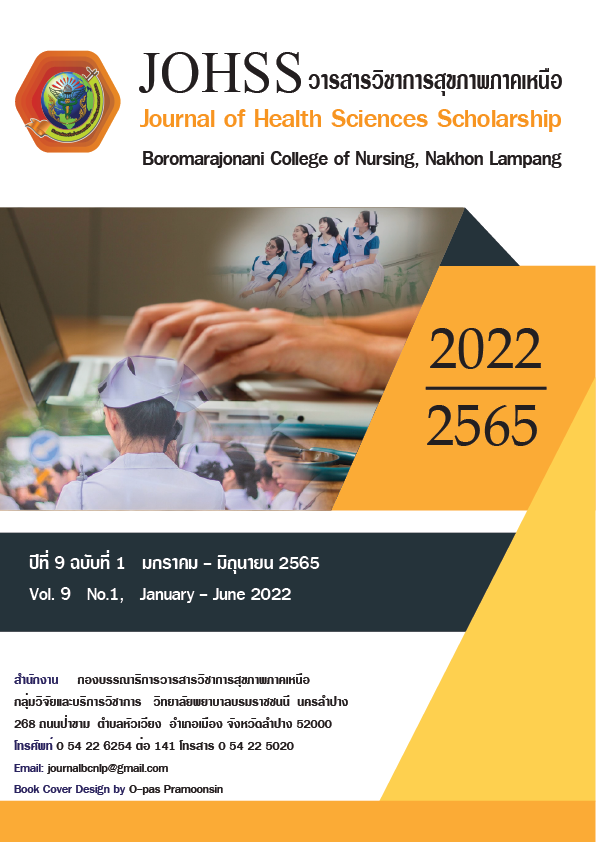ความรอบรู้ด้านการใช้ยาอย่างสมเหตุผลของนักศึกษาพยาบาล วิทยาลัยพยาบาลของรัฐในจังหวัดเชียงใหม่
บทคัดย่อ
การวิจัยเชิงพรรณนาครั้งนี้ มีวัตถุประสงค์เพื่อศึกษาความรอบรู้ด้านการใช้ยาอย่างสมเหตุผล และปัจจัยที่มีความสัมพันธ์กับความรอบรู้ด้านการใช้ยาอย่างสมเหตุผล กลุ่มตัวอย่างเป็นนักศึกษาพยาบาล ของวิทยาลัยพยาบาลบรมราชชนนี เชียงใหม่ ปีการศึกษา 2563 จำนวน 250 คน โดยใช้วิธีการสุ่มแบบแบ่งชั้นภูมิ (Stratified Sampling) รวบรวมข้อมูลโดยใช้แบบสอบถามออนไลน์ โดยหาค่าความเที่ยงตรงเชิงเนื้อหา ได้ค่าดัชนีความสอดคล้องภายในอยู่ในช่วง 0.67 – 1.00 ได้ค่าความเที่ยงของแบบสอบถามจากสูตรคูเดอร์-ริชาร์ดสัน ของแบบสอบถามการใช้ยาเบื้องต้น และแบบสอบถามความรอบรู้ด้านการใช้ยาอย่างสมเหตุผล เท่ากับ 0.79 และ 0.96 วิเคราะห์ข้อมูลโดยใช้สถิติเชิงพรรณนา วิเคราะห์ความสัมพันธ์ของปัจจัยที่มีความสัมพันธ์กับระดับความรอบรู้ด้านการใช้ยาอย่างสมเหตุผล โดยใช้สถิติไคสแควร์ (Chi-square test) ค่าสัมประสิทธิ์สหสัมพันธ์เพียรสัน (Pearson Correlation) ผลการวิจัยพบว่า
กลุ่มตัวอย่างส่วนใหญ่ร้อยละ 77.60 ผ่านการเรียนวิชาเภสัชวิทยาและมีประสบการณ์การเรียนภาคปฏิบัติวิชาการพยาบาล ร้อยละ 49.6 มีความรู้เรื่องการใช้ยาเบื้องต้นอยู่ในระดับสูง (M=12.85 SD=3.31) ร้อยละ 88 มีความรอบรู้ด้านการใช้ยาอย่างสมเหตุผลอยู่ในระดับสูง (M=51.97 SD=13.40) งานวิจัยนี้พบว่าระดับชั้นปี การผ่านวิชาเภสัชวิทยา ประสบการณ์การเรียนภาคปฏิบัติวิชาการพยาบาล และระดับความรู้เรื่องการใช้ยาเบื้องต้น มีความสัมพันธ์กับระดับความรอบรู้ด้านการใช้ยาอย่างสมเหตุผลอย่างมีนัยสำคัญทางสถิติ (p<.001) และพบว่าคะแนนความรู้เรื่องการใช้ยาเบื้องต้นมีความสัมพันธ์เชิงบวกกับคะแนนความรอบรู้ด้านการใช้ยาอย่างสมเหตุผลอย่างมีนัยสำคัญทางสถิติ (r=. .586, p<.001)
ผลการวิจัยนี้สามารถนำไปพัฒนาจัดการเรียนการสอนเรื่องการใช้ยาอย่างสมเหตุผล หรือหลักสูตรอบรมระยะสั้นเกี่ยวกับการใช้ยาอย่างสมเหตุผล เพื่อส่งเสริมให้ผู้เรียนเกิดความรู้และสามารถประยุกต์ใช้ในการพยาบาลผู้ป่วยที่ได้รับยาได้อย่างมีประสิทธิภาพ
เอกสารอ้างอิง
Best, W. (1977). Research in Education. Englewood Cliffs, New Jersey: Prentice Hall, Inc.
Bunmusik, S., Chantra, R., & Heeaksorn, C. (2019). Knowledge Attitude and Behaviors in Rational Antibiotics Use of Nursing Students Southern College of Nursing and Public Health Network. Journal of Health Research and Innovation, 2(1). (in Thai)
Charoensuk, S., Leungratanamart, L., Reunreang, T., Turner, K., & Theinpichet, S. (2020). An Evaluation of Competency in Rational Drug Use of Nursing Graduates. Journal of The Royal Thai Army Nurses, Vol. 21(2), 158-168. (in Thai)
Churyen, A. (2021). The Nurses’ Role in Rational Drug Use in Hospital. Nursing Journal, 48(1), 410-421. (in Thai)
Food and Drug Administration Ministry of Public Health. (2017). Instructional Manual for Rational Use of Drugs. (in Thai)
Health System Research Institute. (2012). Antibiotic Resistant Bacteria Crisis and Solution of Thai Society. (Online), Available: https://kb.hsri.or.th/dspace/handle/11228/3917?locale-attribute=th(2021, January 10).
Khoka, A. (2021). Knowledge and antibiotic use behavior of undergraduate students in Phuket Province. Royal Thai Army Medical Journal, 74(4), 277-290. (in Thai)
Kshirsagar, A. (2016). Rational use of medicines: Cost consideration & way forward. The Indian journal of medical research, 144(4), 502.
Manias, E., & Bullock, S. (2002). The educational preparation of undergraduate nursing students in pharmacology: perceptions and experiences of lecturers and students. International Journal of Nursing Studies, 39(7), 757-769.
Polsingchan, S., & Rungruang, K. (2021). Selected Factors Affecting Rational Antibiotic Use Behaviors of Nursing Students at Boromarajonani College of Nursing, Surin. Nursing Journal of The Ministry of Public Health, 31(1), 211-223. (in Thai)
Samranbua, A., & Thamcharoentrakul, B. (2020). Factor Predicting Rational Drug Use Among Nursing Students in Boromarajjonani College of Nursing, Nakorn Rashisima. Journal of Health and Nursing Education, 26(2), 37-52. (in Thai)
Sornkrasetrin, A., Rungnoei, N., Thongma, N., Klinchat, R., Rajataramya, B., & Nitirat, P. (2019). Factors Predictingthe Rational Antibiotic Use among Nursing Students. Journal of Health and Nursing Education, 25(1), 43-59. (in Thai)
Subcommittee on the Promotion of Rational Drug Use. (2015). Rational Drug Use Hospital Manual. In C. Chayakul (Ed.), (pp. 198). (Online), Available: https://www.hsri.or.th/sites/default/files/attachment/RDU%20Book.pdf. (2021, January 10)
Thailand Nursing and Midwifery Council. (2021). The format of the curriculum of rational drug use in the Bachelor of Nursing program. (Online), Available: https://www.tnmc.or.th/images/userfiles/files/summarymed.pdf. (2021, January 8)
World Health Organization. (1985). The rational use of drugs: review of major issues.
World Health Organization. (2010). Medicines: rational use of medicines. Fact sheet No.338.
World Health Organization Regional Office for South East Asia. (2015). Medicine in Health Care Delivery: Thailand situation analysis. New Delhi: WHO
Yamane, T. (1973). Statistics: An Introductory Analysis. New York: Harper and Row.
Yin, C., He, X., Shen, K., Mu, X., & Tang, F. (2022). Knowledge and Behavior in Rational Drug Use Among College Students in Zunyi City. Risk Management and Healthcare Policy, 15, 121.
ดาวน์โหลด
เผยแพร่แล้ว
ฉบับ
ประเภทบทความ
สัญญาอนุญาต
ลิขสิทธิ์ (c) 2022 วารสารวิชาการสุขภาพภาคเหนือ

อนุญาตภายใต้เงื่อนไข Creative Commons Attribution-NonCommercial-NoDerivatives 4.0 International License.
บทความ ข้อมูล เนื้อหา รูปภาพ ฯลฯ ที่ได้รับการตีพิมพ์ในวารสารวารสารวิชาการสุขภาพภาคเหนือ ถือเป็นลิขสิทธิ์ของวารสารวารสารวิชาการสุขภาพภาคเหนือ หากบุคคลหรือหน่วยงานใดต้องการนำทั้งหมดหรือส่วนหนึ่งส่วนใดไปเผยแพร่ต่อหรือเพื่อกระทำการใดๆ จะต้องได้รับอนุญาตเป็นลายลักอักษรจากวารสารวารสารวิชาการสุขภาพภาคเหนือก่อนเท่านั้น
เนื้อหาและข้อมูลในบทความที่ลงตีพิมพ์ในวารสารวิชาการสุขภาพภาคเหนือถือเป็นข้อคิดเห็นและความรับผิดชอบของผู้เขียนบทความโดยตรงซึ่งกองบรรณาธิการวารสาร ไม่จำเป็นต้องเห็นด้วย หรือร่วมรับผิดชอบใดๆ
อนึ่ง ข้อความและข้อคิดเห็นต่างๆ เป็นของผู้เขียนบทความนั้นๆ ไม่ถือเป็นความเห็นของวารสารฯ และวารสารฯ ไม่จำเป็นต้องเห็นด้วยกับข้อความและข้อคิดเห็นใดๆ ของผู้เขียน วารสารฯ ขอสงวนสิทธิ์ในการพิจารณาตีพิมพ์ตามความเหมาะสม รวมทั้งการตรวจทานแก้ไขหรือขัดเกลาภาษาให้ถูกต้องตามเกณฑ์ที่กำหนด



